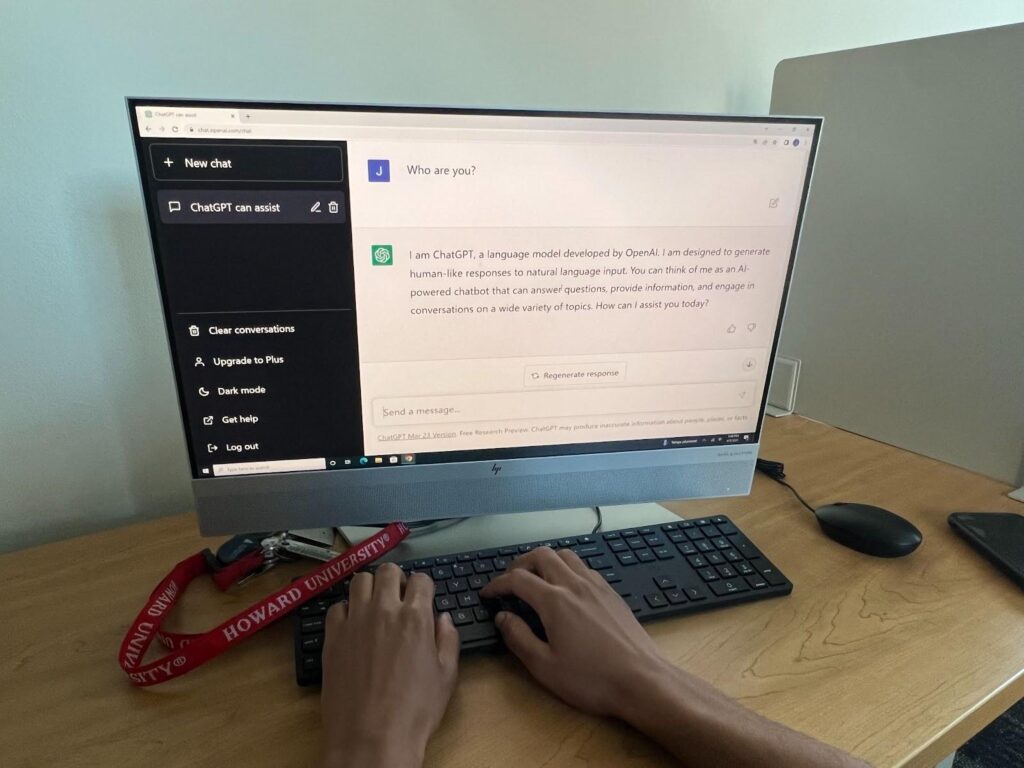
With more upgrades to ChatGPT by OpenAI planned in the future, institutions of learning including universities are determining whether, and to what extent, they will permit the usage of ChatGPT.
Since its introduction, ChatGPT has been a topic of controversy amongst world leaders, professors, secondary school teachers and students. The computer language program was created to replicate a tutoring system to assist students and like-minded professionals.
In May of this year, leaders from Britain, Canada, France, Germany, Italy, Japan and the United States discussed ChatGPT and other generative artificial intelligence – a form of AI that generates text, images, audio or videos – at the G7 conference in Hiroshima, Japan.
“ChatGPT can be a useful adjunctive tool for students when utilized appropriately” Howard University Provost and Chief Academic Officer, Dr. Anthony Wutoh, told The Hilltop.
“However, since academia relies on credible citation practices to measure the reliability and clarity of academic research and knowledge, students should be aware of the wide range of research tools that do not offer the verification and correctness of source material within academic scholarship and culture,” he continued.
According to Voice of America, during the annual G7 convening, leaders called for a working group to establish governance and policies to regulate generative AI by the end of 2023. Governments from around the world expressed intent to develop regulations for AI governance that protect nations’ shared democratic values.
“Because AI tools, such as ChatGPT do not necessarily adhere to such expectations, they may actively destroy information or create false information. As a result, students should understand the limits of the technology and what they can ethically do with the information generated by these technologies,” Wutoh said.
Howard University is in the process of creating an academic policy regarding ChatGPT, according to Wutoh. Due to the lack of an official policy now, students are able to choose if they want to utilize the AI tool when completing homework or assignments.
The Biden Administration published the G7 leaders’ May statement which called for standards for AI utilization around the world and will ultimately impact the global economy, various sectors and particularly educational institutions.
“In areas such as AI, immersive technologies such as the metaverses and quantum information science and technology and other emerging technologies, the governance of the digital economy should continue to be updated in line with our shared democratic values,” said global leaders in their proclamation.
“ChatGPT [text] sounds robotic and non-personable, so I think once permitted, students can use the resource and information to help write their papers,” Kayla Scott, a senior accounting major from Smyrna, Delaware, said.
“It allows students to gather information quickly to start their research and be more efficient with their time,” Scott added.
The New York Times recently reported that colleges around the nation are struggling to decide whether they will ban or accept the use of AI-generated college admissions essays. Administrators and teachers in secondary schools across the nation are also considering how to adopt new commercial AI technologies, repealing bans on ChatGPT utilization by students, according to the New York Times.
Universities are taking different approaches to adapt to the usage of ChatGPT and allowing professors to decide whether it is permitted or not. For example, Harvard University reminds students of the responsibility to ensure the transparency of their work while using the AI tool.
There have been several bans on technology usage in international universities such as Science Po in Paris, France, and RV University in Bengaluru, India. An Australian news outlet, ABC, reported that school districts in Australia have blocked students from accessing ChatGPT on school internet networks.
In the U.S., school districts in Baltimore, Los Angeles, New York City and Seattle expressed concerns over students using ChatGPT for plagiarism and limited access to the generative AI tool to prevent academic dishonesty.
When asked if he allows his students to use ChatGPT, Howard University professor of film and television, Shom Shamapande responded, “Absolutely, in fact, I encourage it.”
“I think it is an amazing technology that will change the art of storytelling and more importantly change how we teach young people. It is a classic example of disruptive technology,” Shamapande said.
Despite its potential benefits, some people worry about the overall integrity of using ChatGPT for collegiate assignments and the risks of permitting its use in universities. According to Best Colleges, 43% of students surveyed admitted to using AI tools or ChatGPT to help complete their assignments.
“The thought of it is very intimidating and honestly kind of scary,” Myla Roundy, a freshman journalism major from Aurora, Illinois, said.
“Coming from the perspective of someone who plans to write for their career, it is quite troubling to see a machine formulate these words and creative pieces in seconds,” Roundy continued. “Even with my concerns, the technology is very fascinating and I would like to see how it will evolve in mainstream media creation.”
Despite its growing and widespread utilization across industries, ChatGPT-4, Open AI’s newest version of the AI tool which requires a subscription unlike its predecessor, has limitations. Such limitations include not being fully reliable, little to no insight into its training data, a limited context window and an inability to learn from experience, according to the University of Sydney’s article released earlier this year.
Although Sam Altman, the CEO of Open AI, has already begun discussing the release of ChatGPT-5, the future of ChatGPT and how it can be used remains to be seen.
“These technologies are relatively new to the general public and should be subject to responsible exploration and experimentation by both instructors and students within the classroom environments,” Wutoh said. “It should be noted that Generative AI tools are not a replacement for critical thinking nor serious academic rigor, but may be useful adjunctive tools in the conduct of academic work.”
Copy edited by Alana Matthew

